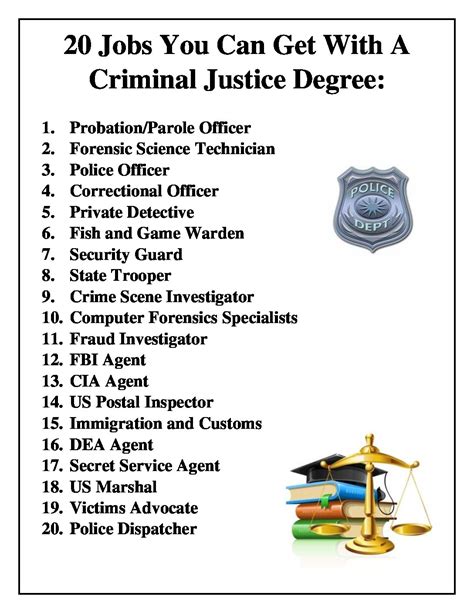Earning a criminal justice degree opens doors to a wide range of career opportunities in law enforcement, corrections, rehabilitation, and other fields related to the criminal justice system.

Careers in Law Enforcement
Police Officer: Enforce laws, investigate crimes, and protect the community. According to the Bureau of Labor Statistics (BLS), the median annual salary for police officers was $67,290 in May 2021.
Detective: Investigate serious crimes, gather evidence, and solve cases. Detectives earned a median salary of $93,320 in May 2021, according to the BLS.
Sheriff’s Deputy: Enforce laws in rural areas and provide security for county residents. The BLS reported that sheriff’s deputies had a median annual salary of $55,480 in May 2021.
Correctional Officer: Supervise and maintain order in correctional facilities. Correctional officers earned a median salary of $54,780 in May 2021, according to the BLS.
Careers in Corrections
Probation Officer: Supervise individuals who have been convicted of crimes but are not imprisoned. The BLS reported that probation officers earned a median salary of $59,860 in May 2021.
Parole Officer: Supervise individuals who have been released from prison and are transitioning back into the community. The median annual salary for parole officers was $59,710 in May 2021, according to the BLS.
Juvenile Justice Counselor: Provide counseling and rehabilitation services to youth who have been involved in the criminal justice system. The median salary for juvenile justice counselors was $48,360 in May 2021, according to the BLS.
Careers in Rehabilitation
Substance Abuse Counselor: Provide counseling and support to individuals who are struggling with substance abuse. The BLS reported that substance abuse counselors earned a median salary of $46,980 in May 2021.
Mental Health Counselor: Provide counseling and therapy to individuals with mental health issues. Mental health counselors had a median annual salary of $49,080 in May 2021, according to the BLS.
Victim Advocate: Assist victims of crime with legal, emotional, and practical support. The median salary for victim advocates was $49,400 in May 2021, according to the BLS.
Other Careers Related to Criminal Justice
Criminal Investigator: Investigate crimes for insurance companies and businesses. The BLS reported that criminal investigators earned a median salary of $81,650 in May 2021.
Forensic Scientist: Analyze evidence, such as fingerprints and DNA, to assist in criminal investigations. The median annual salary for forensic scientists was $59,600 in May 2021, according to the BLS.
Private Investigator: Conduct investigations for individuals and businesses. Private investigators had a median salary of $53,990 in May 2021, according to the BLS.
Tips for Finding a Job with a Criminal Justice Degree
Gain practical experience: Internships and volunteer work can provide you with valuable skills and connections that can help you land a job.
Network with professionals in the field: Attend industry events and conferences to meet potential employers and learn about job opportunities.
Tailor your resume and cover letter to each job you apply for: Highlight your skills and experience that are relevant to the position you are seeking.
Common Mistakes to Avoid
Not doing your research: Before applying for jobs, research potential employers and the industry to ensure that you are a good fit.
Applying for jobs that you are not qualified for: Don’t waste your time applying for jobs that require skills and experience that you do not have.
Giving up easily: The job search can be competitive, but it is important to stay persistent and not give up.
Conclusion
A criminal justice degree can open doors to a wide range of rewarding careers. By following the tips and avoiding the common mistakes mentioned above, you can increase your chances of finding a job that is a good fit for your skills and interests.
Additional Considerations
Emerging Trends in Criminal Justice:
- The use of big data and predictive analytics to identify and prevent crime
- Increased focus on community policing and restorative justice
- Growing demand for professionals trained in cybersecurity and data forensics
Personalization and Innovation:
- Consider combining a criminal justice degree with a minor or certificate in a related field, such as counseling, social work, or forensics.
- Explore emerging job opportunities in fields such as victim advocacy, risk assessment, and homeland security.
- Utilize online resources and professional development opportunities to stay up-to-date on industry trends and best practices.
Tables
1. Median Annual Salaries for Selected Criminal Justice Occupations:
| Occupation | Median Annual Salary (May 2021) |
|---|---|
| Police Officer | $67,290 |
| Detective | $93,320 |
| Sheriff’s Deputy | $55,480 |
| Correctional Officer | $54,780 |
| Probation Officer | $59,860 |
| Parole Officer | $59,710 |
| Substance Abuse Counselor | $46,980 |
| Mental Health Counselor | $49,080 |
2. Projected Job Growth for Selected Criminal Justice Occupations:
| Occupation | Projected Percentage Change in Employment (2021-2031) |
|---|---|
| Police Officer | 5% |
| Detective | 6% |
| Sheriff’s Deputy | 7% |
| Correctional Officer | 8% |
| Probation Officer | 4% |
| Parole Officer | 5% |
| Substance Abuse Counselor | 14% |
| Mental Health Counselor | 11% |
3. Educational Background of Criminal Justice Professionals:
| Education Level | Percentage of Criminal Justice Professionals |
|---|---|
| Associate’s Degree | 28% |
| Bachelor’s Degree | 52% |
| Master’s Degree | 15% |
| Doctoral Degree | 5% |
4. Industries Employing Criminal Justice Professionals:
| Industry | Percentage of Criminal Justice Professionals |
|---|---|
| Local Government | 60% |
| State Government | 20% |
| Federal Government | 10% |
| Private Sector | 10% |
